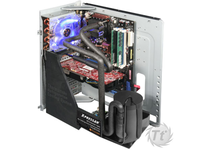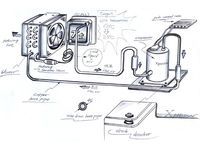Thermaltake's Combines PC Case With Fridge
Thermaltake’s Xpressar RCS100 PC cooling system combines a computer case with a refrigerator.

Thermaltake has officially announced the Xpressar RCS100; the world’s first DC-inverter-type micro-refrigeration cooling system for a PC. Essentially what Thermaltake has done is combine its Xaser VI computer case with the guts of a refrigerator, which is definitely a cool idea. Apparently, the Xpressar RCS100 was able to cool an Intel Core 2 Duo E8400, which had been overclocked to 4.05 GHz, down to 35-degrees Celsius. If the claims are true, that is 20-degrees cooler than the average water-cooling system. As well, with a single 120 mm fan running at 1600 RPM, the noise in the system is claimed to be a near inaudible 20 dB. Somehow it seems hard to believe that the system’s condenser pump would also be that quiet however.
The Xpressar RCS100 is definitely designed with the overclocker in mind, although it does not go too lightly on the power requirements. With the micro-compressor alone using upwards of 50 W, Thermaltake recommends using a power-supply that can support the system hardware plus an additional 100 W. As for PC system compatibility, processors using Intel’s LGA775 or LGA1366 sockets are supported, meaning this system should be compatible with Intel’s upcoming Bloomfield processors. Many popular motherboards are supported, such as the Asus P5Q, although a motherboard with an odd placement for its processor socket may not be compatible. Lastly, some motherboards will leave only enough room for one video card, mainly affecting MSI motherboards it would seem.

The micro vapor-compression refrigeration system used in the Xpressar RCS100 is like that of what you might find in a refrigerator or an air-conditioning unit. The CPU cooling process involves a phase change of a refrigerant from a liquid to a gas state, which allows the refrigerant to absorb heat from the processor. Afterwards, the compressor and condenser work together to bring the gas back to a liquid state and the cycle begins again. The refrigerant is environmentally-friendly and the system is equipped with an intelligent IC controller to prevent condensation from forming.
There is no word on price yet, but it should be available at retail stores shortly.
Stay on the Cutting Edge
Join the experts who read Tom's Hardware for the inside track on enthusiast PC tech news — and have for over 25 years. We'll send breaking news and in-depth reviews of CPUs, GPUs, AI, maker hardware and more straight to your inbox.
-
kyeana well if the price tag isn't outrageous this could prove to be fun. Only time will tell i guessReply -
DFGum Finally, and it should be quiet as it says.You dont see mini fridge's making tons of noise. Sure you can hear when they kick on but its pretty quiet.Reply -
there is no pump in this system. the vapor compression cycle doesn't need a pump it only needs at compressor, condenser, evap, and a metering deviceReply
-
there is an error in your assumption about a condenser pump noise. In the vapor compression cycle, a pump is not needed to move the refrigerant. the refrigerant will move to the path of least resistance(high pressure to low pressure). the compressor may be noisey but it looks as the padded it in alot of insulationReply
-
eklipz330 by the looks of it, only the processor will be refrigeratedReply
i want EVERYTHING to be refrigerated ... so air cooling would be more effective -
Yeah putting your PC in a fridge is a bad idea. It's called condensation and it's why this thing is only cooling the CPU not the whole case.Reply
Ever fire up electronics after they've been in a cold car for a while? It ain't pretty. -
The real space heaters are the video cards (just looking at the type of client likely to buy this), especially now that they can be used for distributed computing programs. At some cooling for video cards and NOW we're talking.Reply
-
Floydage The first phase change cooling PC case? I've seen phase changing cooling PC's before. Does anyone remember the Prometeia mach II? Tom's even did a review on it, so I must be missing something?! http://www.tomshardware.com/reviews/prometeia,571.htmlReply
Most Popular

